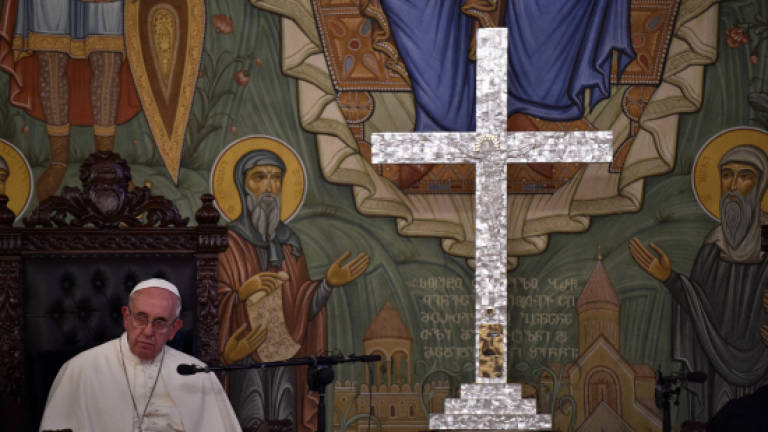Pope calls for 'coexistence' at start of Caucasus tour

TBILISI: Pope Francis called Friday for respect of national sovereignty and "coexistence" as he arrived in Georgia, but seemed to dodge potential Russian ire at the start of a visit to the volatile Caucasus region.
The pontiff was greeted warmly by President Giorgi Margvelashvili and the leader of the Georgian Orthodox church, Patriarch Ilia II, at the start of the three-day visit to Georgia and Azerbaijan that the Vatican has billed as a peace mission.
Pro-Western Georgia – one of the oldest Christian nations in the world – fought a brief war with Russia in 2008 and two Moscow-backed breakaway regions, South Ossetia and Abkhazia, which remain out of Tbilisi's control.
After a meeting with the pontiff, Margvelashvili thanked him for supporting Georgia's territorial integrity, saying that "20% of the Georgian territory remains under occupation" by the Russian troops.
But in a speech at the courtyard of the presidential palace, made before government officials, civil society leaders, and foreign diplomats, Francis did not mention Russia and the word "occupation."
Apparently wary of irritating the Kremlin and Russia's powerful Orthodox Church, he only made general calls for "the respect of sovereign prerogatives of all countries within the framework of international law."
"Coexistence between all peoples and states in the region" is "an indispensable precondition" to achieve peace and stability, he said.
On Sunday, Francis is due in Azerbaijan, where he will meet with, among others, President Ilham Aliyev, just days after the authoritarian leader won a referendum on constitutional changes seen as consolidating his grip on power.
While in the energy-rich country, Francis is expected to reiterate the call he made three months ago in Armenia for a peaceful resolution of the long-simmering conflict over the disputed region of Nagorny Karabakh.
Officially part of Azerbaijan, the territory has been under the control of ethnic Armenian separatists since 1994, when a war between the two countries ended in a ceasefire but no formal peace accord.
Since then, there have been sporadic outbursts of violence, including one in April that left 110 people dead.
Steps to peace
Interfaith dialogue and reconciliation between different branches of Christianity have been dominant themes of Francis's papacy.
And he will be seeking to strengthen relations with the Georgian Church which, like other Orthodox churches, doesn't recognise papal primacy and has doctrinal differences with the Roman Catholic Church.
The churches' disagreements on a number of theological issues explain why Pope Francis and Patriarch Ilia II will not pray together in public during the pontiff's visit to Georgia.
"The papal visit may bring in a certain thaw in the two churches' relations, but not a breakthrough," Levan Sutidze, religion columnist at Georgia's Tabula magazine, told AFP.
"Theological differences are substantial and the Georgian Church is known for its isolationist position."
Ilia, 83, has overseen a post-Soviet revival of a church which claims the loyalty of more than 80% of Georgia's 4.9 million population.
The church leader is a conservative figure known for some controversial views, including that homosexuality is a disease that should be treated like drug addiction.
Georgia was one of the cradles of early Christianity and one of Jesus's apostles, Andrew, is credited with spreading the faith to the territories that make up modern Georgia.
Occupied by the Bolsheviks in 1921, the country regained its independence from the Soviet Union in 1991 and is now targeting membership in the European Union and NATO – a process its diplomats hope will be "pushed a step forward" by the papal visit. — AFP